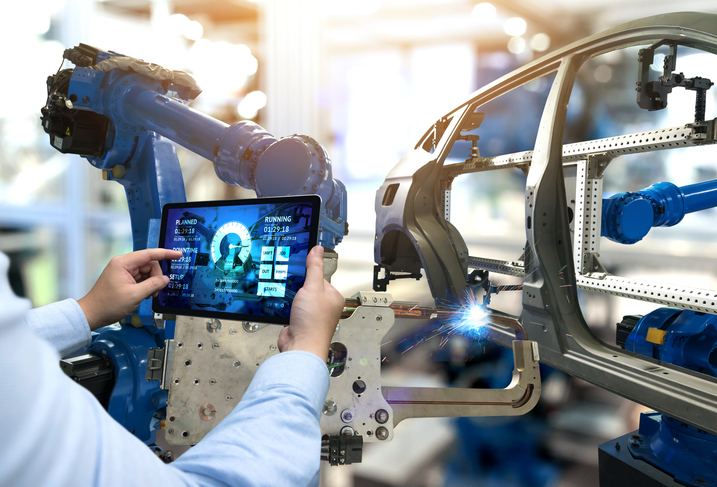Blockchain and ERP: What does it mean for the manufacturing and distribution sectors?
The convergence of between blockchain and enterprise resource planning (ERP) systems is revolutionizing the way organizations manage and share data, leading to a more secure, transparent, and efficient future.
Key Takeaways
- Integration of blockchain and ERP systems unlocks potential opportunities to automate processes, enhance data security and streamline supply chain operations.
- Smart contracts enable efficient business transactions with increased accuracy, optimized supply chain management & improved cybersecurity.
- Blockchain integration offers enhanced collaboration, risk management & compliance for real-time data sharing among stakeholders.

How to Protect Your Supply Chain and Mitigate Disruptions During a Time of Crisis
Gain valuable insights on how to implement supply chain disruption mitigation strategies.
Blockchain can be described as a decentralized, distributed ledger that records transactions across multiple computers. It drives cryptocurrencies, smart contracts, and offers manufacturing and distribution organizations the potential to support traceability, records management, supply chain automation, payment applications and other operational transactions.
Researchers note that the business value-add of Blockchain will grow to slightly more than $176B by 2025, then exceed $3.1T by 2030. In fact, a study by PwC reports 24% of industrial manufacturing CEOs are exploring or deploying the technology.
With this astounding volume of transactions comes a transformation of enterprise data.
There are significant business process improvement considerations. Blockchain delivers a near-real-time record that’s replicated among a network of business partners that is immutable in nature. The process takes information that would have previously been stored in the ERP silos of just one company and makes it available in a distributed network of records across disparate companies.
Unlocking the Potential of Blockchain in ERP
The combination of blockchain technology and ERP systems has the power to transform businesses by automating processes, enhancing data security, and streamlining supply chain operations. As organizations explore the potential benefits of integrating these technologies, they are discovering innovative ways to improve their operations, utilizing their business data more effectively.
This era of digital transformation witnesses the merger of blockchain and ERP systems propelling efficiency and growth in multiple industries.

Enhancing Data Security with Blockchain
In today’s digital environment, data security is a top priority for businesses. Blockchain technology provides a robust system model that significantly enhances data security in ERP systems, minimizing the risk of data breaches and manipulation. Organizations can address common security issues like unknown vulnerabilities, missing software updates, and weak authentication by incorporating blockchain into ERP systems, which optimizes the supply chain process while safeguarding data integrity.
Blockchain’s decentralized structure offers several benefits, including:
- Strengthening data security by distributing the responsibility of maintaining the ledger across multiple participants in the network
- Preventing any single entity from controlling the data
- Ensuring that any attempts to alter or corrupt the ledger will be rejected by the majority of network members
With the integration of blockchain and ERP systems, businesses can establish a transparent, secure, and tamper-proof foundation for their operations, building trust and collaboration among stakeholders.
Streamlining Supply Chain Processes
The integration of blockchain with ERP systems can revolutionize supply chain management by providing:
- Real-time visibility and traceability
- Digitized transactions and information
- An immutable record shared with all authorized members
- Comprehensive visibility into business operations
- Enhanced capabilities of current ERP systems
- Improved efficiency and decision-making
Moreover, blockchain technology enables secure data sharing across company and industry boundaries, fostering trust and collaboration among supply chain participants. The shared ledger, linked through cryptography, allows for real-time, scalable data sharing between different organizations without the need for duplicate data entry into separate databases. As a result, integrating blockchain with ERP systems can optimize supply chain operations, reduce visibility problems, and facilitate efficient collaboration, ultimately driving business success.
Smart Contracts for Efficient Business Transactions
One of the most promising aspects of blockchain technology is the implementation of smart contracts—computer protocols that automatically verify and enforce contractual obligations, eliminating the need for third-party intermediaries. Integrating smart contracts within ERP systems can automate business processes, streamlining various operations, reducing manual intervention, and enhancing overall efficiency.
Smart contracts can expedite financial transactions, automate purchase orders, and authenticate identities, providing a risk-free and efficient method for conducting business transactions. By integrating blockchain-based smart contracts into ERP systems, organizations can unlock numerous benefits, including increased data accuracy, optimized supply chain management, and improved cybersecurity. This powerful combination has the potential to revolutionize the way businesses operate, paving the way for a more secure and efficient future.

The Synergy Between ERP Systems and Distributed Ledger Technology
The synergy between ERP systems and distributed ledger technology is a game-changer for businesses, enabling:
- Real-time data sharing
- Collaboration
- Improved risk management
- Compliance
Combining the comprehensive solution of ERP systems with the decentralized and transparent nature of blockchain technology can lead to a more efficient and secure way of conducting business operations.
Real-Time Data Sharing and Collaboration
When blockchain is synchronized with ERP systems, it facilitates:
- Safe and instant data sharing across organizations
- Promoting trust and collaboration among stakeholders
- Shared, decentralized, and immutable ledger
- Authorized parties can access up-to-date information and updates
- Improving data visibility and accessibility
- Increasing transparency and traceability in the ERP system
- Bridging trust gaps
- Paving the way for innovative business models and opportunities
In addition to enhancing data sharing, blockchain integration with ERP systems can help organizations overcome challenges such as data loss, data interoperability, and siloed information. Blockchain technology offers a consolidated platform for data management that removes redundancies, streamlines processes, and ultimately enhances decision-making and overall efficiency.
Risk Management and Compliance
Blockchain’s transparency features can help organizations maintain compliance and manage risks more effectively when integrated with ERP systems. By providing increased visibility and traceability of transactions, blockchain bolsters data security and ensures that all transactions are recorded in a tamper-proof and verifiable manner. This transparency aids in preserving compliance with regulations and enables superior risk management in ERP systems.
Integrating blockchain into ERP systems can help mitigate risks associated with data security, fraud prevention, supply chain, compliance, and data interoperability more effectively. This powerful combination allows organizations to stay ahead of potential threats, maintain regulatory compliance, and capitalize on the transformative potential of blockchain technology to drive business growth.

Overcoming Integration Challenges
Successfully integrating blockchain and ERP systems can be a complex process, but the benefits far outweigh the challenges. To unlock the full potential of this powerful convergence, organizations need to choose the right blockchain platform and partner with ERP vendors for a smooth integration process.
We will now examine the primary factors for overcoming integration hurdles and guaranteeing a smooth merger of blockchain and ERP.
Partnering with ERP Vendors for Smooth Integration
Working together with ERP vendors aids organizations in navigating the integration process. By partnering with experienced vendors, companies can access valuable insights, best practices, and technical expertise to facilitate a smooth and effective integration. Major ERP vendors such as SAP, Microsoft, and Oracle have already adopted blockchain technology, offering a range of solutions to help businesses integrate this transformative technology into their ERP systems.
Conclusion
The integration of blockchain technology with ERP systems presents a wealth of opportunities for businesses looking to enhance data security, streamline supply chain processes, and automate business transactions. By embracing the synergy between these innovative technologies, organizations can unlock the full potential of real-time data sharing, collaboration, risk management, and compliance. Overcoming integration challenges by selecting the right blockchain platform and partnering with ERP vendors is crucial for a successful and seamless convergence. As the future of blockchain and ERP unfolds, businesses that adapt and innovate will undoubtedly lead the way in a more secure, transparent, and efficient digital world.
Value achieved through integrating Blockchain and ERP systems comes not by adding new information into the distributed ledger, but by linking existing data from enterprise systems and being able to tightly control with whom it is shared.
- Learn more by viewing the entire on demand webinar session Ultra conducted on Blockchain and ERP.
- Contact the Ultra team for additional information.
Table of Contents
More ERP material...
The Undeniable Benefits of Implementing ERP in Food and Beverage Manufacturing
Data analytics holds the ability to highlight inefficient manufacturing processes and enable…
Emerging Technologies in Manufacturing Driving Business Growth
Data analytics holds the ability to highlight inefficient manufacturing processes and enable…
How Food Production ERP Improves Manufacturing Efficiency
Data analytics holds the ability to highlight inefficient manufacturing processes and enable…



